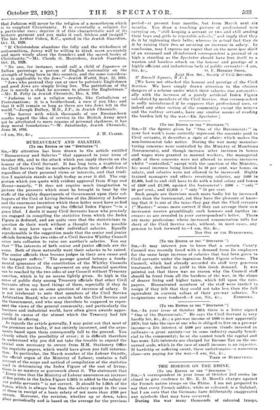BUREAUCRACY AND SALARIES.
[To THE EDITOR Or THE "SPECTATOR."] SIR,—My attention has been drawn to the article entitled " Bureaucracy and Salaries " that appeared in your issue of October 9th, and to the attack which you imply therein on the honour of the Civil Servant. It has long been a tradition of the Civil Service that its members perform their official duties regardless of their personal views or interests, and that tradi- tion I maintain stands as high to-day as ever it did. The sug- gestion which you quote with evident approval from Ways and Means—namely, "It does not require much imagination to picture the pressure which must be brought to bear by the staffs of the eighty departments of Government upon their col- leagues of the Cost of Living Section of the Ministry of Labour and the enormous incentive which these latter must have to find every excuse for pushing up the Official Index Figure "—is a gross libel. I doubt if many Civil Servants know who precisely are engaged in compiling the statistics from which the Index Figure is deduced, and am quite sure that the statisticians in question do their work without a thought as to the possible effect it may have upon their individual salaries. Equally reprehensible is the suggestion made that the senior and junior officials forming the two sides of a Civil Service Whitley Council enter into collusion to raise one another's salaries. You say that "The interests of both senior and junior officials are the same. Both of them naturally want their salaries to be raises'. The senior officials thus become judges in their own cause and the taxpayer suffers." The passage quoted betrays a funda- mental ignorance of the constitution of the Whitley Councils in the Civil Service. No agreement on any financial question can he reached by the two aides of any Council without Treasury sanction, which is by no means lightly given. So high is the sense of public duty among Treasury officials that other Civil Servants often say hard things of them, especially if they do not see eye to eye on some question of increase of salary. It is not irrelevant to note that members of the Civil Service Arbitration Board; who are outside both the Civil Service and the Government, and who may therefore be supposed to repre- sent the views of the general community, and particularly the business and industrial world, have often given awards appre- ciably in excess of the utmost which the Treasury had felt justified in offering.
As regards the article generally, I may point out that most of the premises are faulty, if not entirely incorrect, and the argu- Sleets based upon them consequently fall to the ground. You clearly admit the possibility of error; it is difficult therefore to understand why you did not take the trouble to expend the trivial sum necessary to secure from H.M. Stationery Office the requisite papers, which would have given you full informa- tion. In particular, the March number of the Labour Gazette, the official organ of the Ministry of Labour, contains a full account of the scope and method of compilation of the statistics used in determining the Index Figure of the cost of living; there is no mystery or guesswork about it. The statement that Every time that the Ministry of Labour announces an increase 5f. TO Points in the Index Figure 1-26th is added to the salary of our public servants" is not correct. It should be 1-26th of the bonus, which is always leas than the salary except in the case of those ID receipt of a basic salary of not more than .1160 per 4nnan,- Moreover, the revision, whether up or down, takes Once Periodically and is based on the average for the previous period—at present four months, but from March next six months. You draw a touching picture of professional men carrying on, "still keeping a servant or two and still sending their boys and girls to reputable schools," and imply that they do it by tightening their belts; whereas in actual fact they do it by raising their fees eir securing an increase in salary. In conclusion, may I express my regret that on the mere ipso dish of an umlauted and ill-informed correspondent a journal of so high a standing as the Spectator should have lent itself to a wanton and baseless attack on the honour and prestige of a highly efficient and industrious body of public servants?—I am,
Joint Hon. Sec.. Society of Civil Servants. 17 Russell Square, W.VA.
[We have not attacked the honour and prestige of the Civil Service. We have simply drawn attention to the obvious dangers of a scheme under which their salaries rise automatie- ally with the increase of a purely artificial Index Figure calculated by members of the Civil Service. Our correspondent is sadly misinformwl if he supposes that professional men, or indeed any other section of the community except the miners and the railway servants, have any similar means of evading the burden left by the war.—ED. Spectator.]


































 Previous page
Previous page